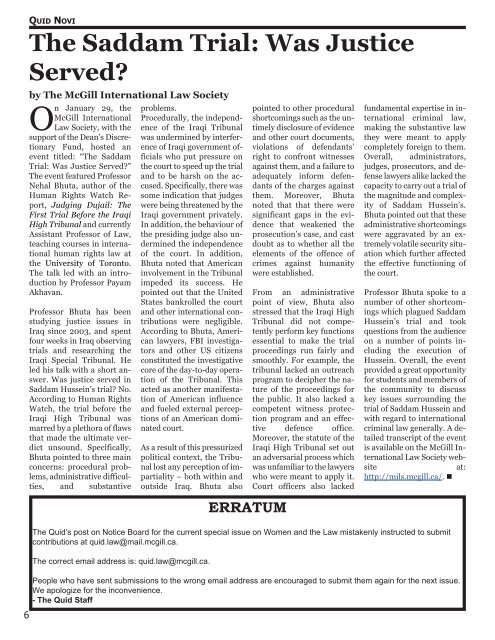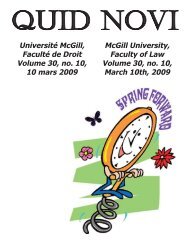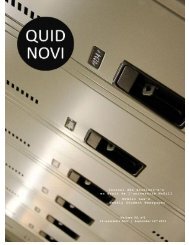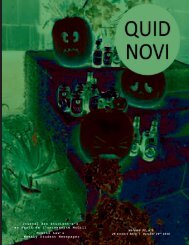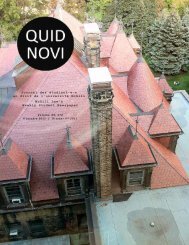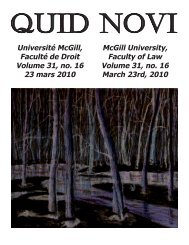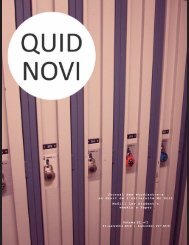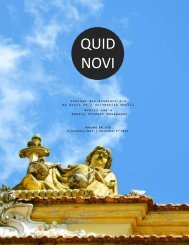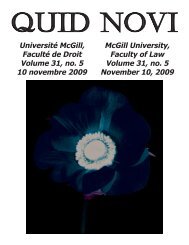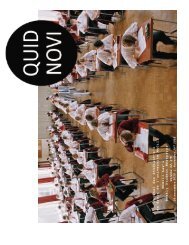Create successful ePaper yourself
Turn your PDF publications into a flip-book with our unique Google optimized e-Paper software.
6<strong>QUID</strong> <strong>NOVI</strong>The Saddam Trial: Was JusticeServed?by The McGill International Law SocietyOn January 29, theMcGill InternationalLaw Society, with thesupport of the Dean’s DiscretionaryFund, hosted anevent titled: “The SaddamTrial: Was Justice Served?”The event featured ProfessorNehal Bhuta, author of theHuman Rights Watch Report,Judging Dujail: TheFirst Trial Before the IraqiHigh Tribunal and currentlyAssistant Professor of Law,teaching courses in internationalhuman rights law atthe University of Toronto.The talk led with an introductionby Professor PayamAkhavan.Professor Bhuta has beenstudying justice issues inIraq since 2003, and spentfour weeks in Iraq observingtrials and researching theIraqi Special Tribunal. Heled his talk with a short answer.Was justice served inSaddam Hussein’s trial? No.According to Human RightsWatch, the trial before theIraqi High Tribunal wasmarred by a plethora of flawsthat made the ultimate verdictunsound. Specifically,Bhuta pointed to three mainconcerns: procedural problems,administrative difficulties,and substantiveproblems.Procedurally, the independenceof the Iraqi Tribunalwas undermined by interferenceof Iraqi government officialswho put pressure onthe court to speed up the trialand to be harsh on the accused.Specifically, there wassome indication that judgeswere being threatened by theIraqi government privately.In addition, the behaviour ofthe presiding judge also underminedthe independenceof the court. In addition,Bhuta noted that Americaninvolvement in the Tribunalimpeded its success. Hepointed out that the UnitedStates bankrolled the courtand other international contributionswere negligible.According to Bhuta, Americanlawyers, FBI investigatorsand other US citizensconstituted the investigativecore of the day-to-day operationof the Tribunal. Thisacted as another manifestationof American influenceand fueled external perceptionsof an American dominatedcourt.As a result of this pressurizedpolitical context, the Tribunallost any perception of impartiality– both within andoutside Iraq. Bhuta alsoERRATUMpointed to other proceduralshortcomings such as the untimelydisclosure of evidenceand other court documents,violations of defendants’right to confront witnessesagainst them, and a failure toadequately inform defendantsof the charges againstthem. Moreover, Bhutanoted that that there weresignificant gaps in the evidencethat weakened theprosecution’s case, and castdoubt as to whether all theelements of the offence ofcrimes against humanitywere established.From an administrativepoint of view, Bhuta alsostressed that the Iraqi HighTribunal did not competentlyperform key functionsessential to make the trialproceedings run fairly andsmoothly. For example, thetribunal lacked an outreachprogram to decipher the natureof the proceedings forthe public. It also lacked acompetent witness protectionprogram and an effectivedefence office.Moreover, the statute of theIraqi High Tribunal set outan adversarial process whichwas unfamiliar to the lawyerswho were meant to apply it.Court officers also lackedfundamental expertise in internationalcriminal law,making the substantive lawthey were meant to applycompletely foreign to them.Overall, administrators,judges, prosecutors, and defenselawyers alike lacked thecapacity to carry out a trial ofthe magnitude and complexityof Saddam Hussein’s.Bhuta pointed out that theseadministrative shortcomingswere aggravated by an extremelyvolatile security situationwhich further affectedthe effective functioning ofthe court.Professor Bhuta spoke to anumber of other shortcomingswhich plagued SaddamHussein’s trial and tookquestions from the audienceon a number of points includingthe execution ofHussein. Overall, the eventprovided a great opportunityfor students and members ofthe community to discusskey issues surrounding thetrial of Saddam Hussein andwith regard to internationalcriminal law generally. A detailedtranscript of the eventis available on the McGill InternationalLaw Society websiteat:http://mils.mcgill.ca/. The Quid’s post on Notice Board for the current special issue on Women and the Law mistakenly instructed to submitcontributions at quid.law@mail.mcgill.ca.The correct email address is: quid.law@mcgill.ca.People who have sent submissions to the wrong email address are encouraged to submit them again for the next issue.We apologize for the inconvenience.- The Quid Staff


